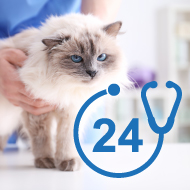
Review will consider implications of new technologies
The RCVS has set out a new timeline and methodology for its wide-ranging review of its guidance to the veterinary professions on ‘under care’ and 24-hour emergency cover.
The ‘under care’ guidance review was recommended to RCVS Council by its Standards Committee and will consider the implications of new technologies for both animal health and welfare and veterinary regulation.
Under the original timetable, the review was supposed to start at the end of 2019. However, following discussions about methodology with the Standards Committee, the first stage will now start in April 2020.
“Regretfully, as the scope and complexity of the review became clearer following Council’s approval of the project, it was also apparent that the original methodology, and the timetable set for it, was not going to be suitable to the task,” explained Melissa Donald, chair of the RCVS Standards Committee.
“Therefore, over the past few months, the Standards Committee and College staff have been working hard with the external research agency to revise the methodology and we have now reached the stage where we are confident we have got it right, and can now proceed with the review.”
She continued: “While we regret the delay, as this review relates to fundamental principles about the provision of veterinary care, it is vital we get it right and that the process is as comprehensive as possible. It is better that it is right than rushed.”
Under the new methodology, the review has been split into the following three stages:
1. An evidence-gathering stage comprising focus group discussions starting this month and taking place across the UK, subject to the latest UK Government advice on COVID-19. For this stage, the external research agency will be inviting a wide range of vets from across different sectors and practices to give their views. There will also be a separate focus group discussion for veterinary nurses. The outcome of these discussions will inform the format of and questions to be included in the second-stage survey. Stakeholders, including representative bodies and other veterinary groups, will also be asked for their input at this stage.
2. Following the analysis of the focus group discussions, an online survey for the veterinary professions will be launched in summer and will be live for six weeks. Informed by the views arising from the focus groups, this survey will invite views and feedback from the professions.
3. Any proposed changes to the Code of Professional Conduct and its supporting guidance on the concept of ‘under care’ and 24/7 emergency cover arising from the survey will be the subject of public consultation.
Melissa Donald added: “Invitations to our regional focus group discussions, which will be selected randomly from amongst the professions by our research agency, will be going out soon and I would urge anyone who receives an invitation to come along and share their views and ideas.”



 The latest
The latest